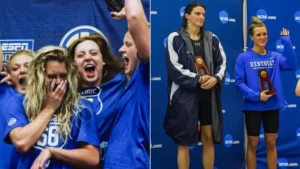
In a groundbreaking and decisive move, the National Collegiate Athletic Association (NCAA) has announced the complete transfer of all medals awarded to Lia Thomas to fellow swimmer Riley Gaines. This unprecedented decision marks a significant shift in the ongoing discourse surrounding fairness, inclusivity, and the evolving landscape of competitive sports. As the sporting community grapples with the implications of this bold move, it prompts a reevaluation of policies and a broader conversation about the delicate balance between recognizing individual achievements and ensuring fair competition.
The transfer of medals comes in the wake of an extended period of controversy surrounding Lia Thomas’s dominance in collegiate swimming. As a transgender athlete, Thomas’s achievements became a focal point for debates on fairness and the intricate dynamics of competition within women’s sports. The NCAA, which initially deemed her participation in compliance with regulations, now takes a monumental step to address the complex challenges posed by the intersection of identity and competitive athletics.
With the transfer of all medals from Thomas to Gaines, the spotlight now shifts to Riley Gaines, an accomplished athlete whose talents have often been overshadowed by the ongoing debates surrounding Thomas. The decision not only acknowledges Gaines’s individual achievements but also serves as a symbolic triumph in the face of systemic challenges that can sometimes obscure the recognition of talented athletes.
The decision to transfer all medals is unprecedented in collegiate sports history. It prompts a crucial conversation about how governing bodies like the NCAA navigate the intricate path between inclusivity and maintaining fair competition. As societal perceptions of gender identity evolve, sports organizations find themselves at the forefront of adapting policies to ensure an equitable playing field for athletes from diverse backgrounds.
The NCAA’s announcement has triggered a spectrum of reactions from the public, athletes, and sports enthusiasts alike. Some applaud the decisive move as a step towards acknowledging the accomplishments of all athletes, while others express concerns about the potential implications for future evaluations of transgender athletes. The public discourse surrounding this decision underscores the broader societal impact of policy changes in the realm of collegiate sports.
For Lia Thomas, the transfer of all medals signifies a significant juncture in her athletic journey. The focus now shifts from her individual achievements to a recalibration of honors, prompting discussions about the broader implications of transgender athletes in collegiate sports. Her experience becomes emblematic of the evolving narrative around identity and inclusivity within the sporting arena.
For Riley Gaines, the transfer of all medals becomes a symbol of resilience and long-awaited recognition. It is not only a personal triumph but also a representation of the broader challenges faced by athletes who strive for recognition in an environment that sometimes struggles to appreciate the diversity of talents and identities within its ranks.
The NCAA’s decision to transfer all medals prompts a broader conversation about the future of inclusivity in collegiate sports. Crafting policies that embrace the diversity of identities while maintaining the principles of fair competition is a complex challenge. It requires a collaborative effort, drawing on the expertise of athletes, medical professionals, ethicists, and administrators to create policies that stand the test of time.
As the NCAA transfers all medals from Lia Thomas to Riley Gaines, collegiate athletics find themselves at the forefront of change. This decisive move is not just about the recognition of individual achievements; it signifies a commitment to fostering an environment where every athlete, regardless of background, is acknowledged and celebrated. The ongoing dialogue sparked by this decision is crucial in shaping the future of collegiate sports, creating a more inclusive and equitable landscape for generations of athletes to come.





